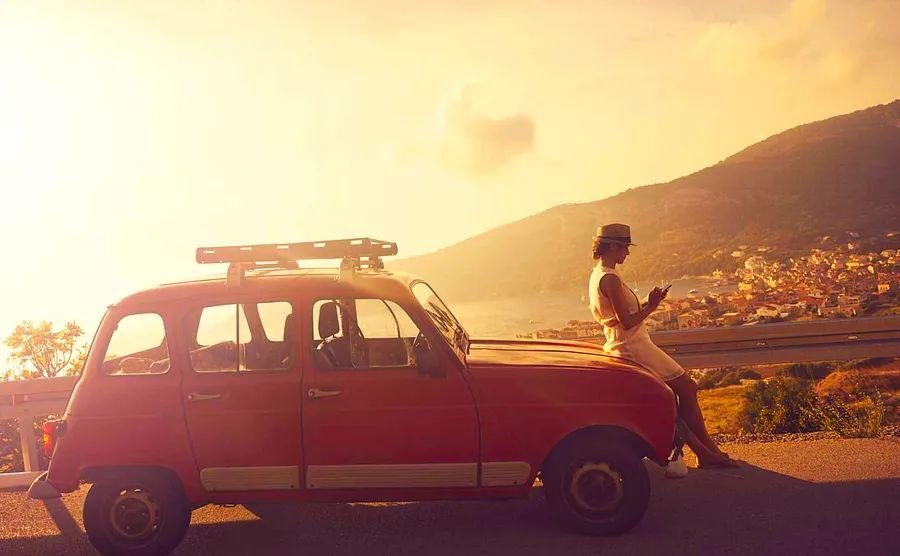7 Essential Road Trip Tips Every Traveler Needs

 Image: Getty Images
Image: Getty ImagesNothing is more frustrating than starting your road trip only to realize you've forgotten something important or that your key fob battery has died halfway to your destination. To prevent unnecessary stops and stress, review this list of road trip tips before hitting the road.
Get your vehicle ready for long journeys.
The American Automobile Association (AAA) states that most vehicle breakdowns can be avoided by servicing your car before you set off. Visit a mechanic at least a week prior to your road trip to check the oil and tire pressure, and ensure the battery, brakes, and engine are in good condition.
While many new vehicles now come equipped with inflation kits, most still lack spare tires, including rental cars. If you have a run-flat or temporary doughnut tire, keep in mind they are meant for short-term use until the flat can be repaired or replaced. Think about investing in a spare tire kit that includes a tire, jack, and lug wrench, priced between $150 and $300.
Consider carrying an extra battery for your key fob. "You'd be amazed at how many car keys fail while traveling, leaving people locked out of their vehicles," warns an AAA representative.
Before you start your journey, assemble an emergency kit containing distilled water, a battery charger, a first-aid kit, jumper cables, and flares or reflectors. Make sure to learn how to use the jumper cables (check out YouTube tutorials) before you hit the road.
Organize your packing.
Loading and unloading your car can take a lot of time. Road trip expert Tamela Rich, author of three books, recommends starting with nonessential items—things you won't need until you arrive—before adding essentials like a camera or purse. A trunk organizer can help keep everything in order. Lastly, secure rooftop cargo with a storage box; Packasport offers various sizes and can customize a hard-shell case for your vehicle.
For multi-city road trips, use a weekender bag separate from your main luggage, packing daily necessities like pajamas and toiletries. "This avoids the hassle of moving heavy luggage in and out of the car each time you check into a hotel," advises Rich.
Utilize apps to plan your stops.
If you're driving on a major interstate, the iExit app provides details about amenities at upcoming exits, including gas stations, grocery stores, hotels, and hospitals, along with local attractions.
Clean restrooms can significantly enhance your pit stops. For trustworthy bathrooms along your route, visit diaroogle.com or use the Where is Public Toilet app.
Organize your devices.
Struggling to find a spot for your phone to check your maps? Create a DIY phone holder using a binder clip and a rubber band that attaches to air vents. Running low on charging outlets for all passengers? Consider a multi-outlet adapter, like the Anker USB C Car Charger.
Carry cash.
Prepare for unexpected tolls by keeping extra $1 and $5 bills for booths without electronic toll collection, or in case your E-ZPass or FasTrak fails on your route. You can also fill old pill bottles with quarters for easy access at toll booths or parking meters. The Parkmobile app simplifies parking fee payments and is available in over 400 U.S. cities.
Keep essentials accessible.
To prevent headaches and irritability from dehydration, ensure everyone in the car has a reusable glass or stainless-steel water bottle that can be refilled along the journey. It's also wise to pack a bag with wet wipes, paper towels, hand sanitizer, and trash bags for any spills or messes.
Even if you plan to dine out, bring along a portable cooler filled with tidy, healthy snacks like baby carrots, apples, grapes, boiled eggs, and nuts. These foods, rich in protein and fiber, help maintain stable blood sugar levels and digestion during travel, according to Rich.
Remember to take regular breaks.
Kendra Thornton, president of Royal Travel & Tours, recommends breaking up long drives by stopping every two to three hours, whether for a meal, to visit an attraction, or to stretch your legs at a rest stop. "Frequent breaks turn the journey into a series of manageable segments instead of one long haul," she explains.
Don't overlook popular food destinations on your route. TVFoodMaps.com has compiled a list of over 4,000 restaurants highlighted on well-known television shows like Diners, Drive-Ins and Dives. Roadfood.com features hundreds of authentic, locally owned eateries that often outshine fast-food options. Farmers' markets are also fantastic for discovering prepared regional specialties, like Native American fry bread in New Mexico or barbecued pork in the Carolinas.

1

2

3

4

5
Evaluation :
5/5